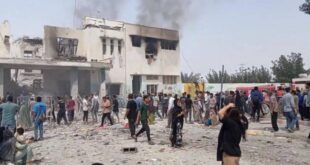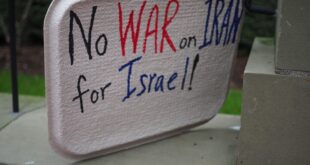 TEHRAN (AFP) — Cyclone Gonu, the worst tropical storm to hit the Gulf in decades, made landfall in Iran on Wednesday afternoon, packing winds of 200 kilometres an hour and  forcing the evacuation of tens of thousands of people, officials said.
TEHRAN (AFP) — Cyclone Gonu, the worst tropical storm to hit the Gulf in decades, made landfall in Iran on Wednesday afternoon, packing winds of 200 kilometres an hour and  forcing the evacuation of tens of thousands of people, officials said.
The storm hit the east coast of Oman earlier in the day, with winds snapping trees and blowing over street signs, while heavy rains flooded some roads.
There were no reports of casualties in either country.
The heavy rain and wind led to flights being suspended at Muscat airport, but the cyclone has so far not affected shipping in the Strait of Hormuz through which at least a quarter of world oil supplies passes, officials said. “Maritime activities in the Strait of Hormuz are as usual. We have no indication of any disruption,” an Omani transport ministry official told AFP.
By evening, Iran was starting to feel the full brunt of the weather in the southern coastal provinces of Hormorzgan and Sistan Baluchestan, which lie only some 100 kilometres across the Gulf from northern Oman. Winds were lashing the port of Bandar Abbas, the capital of Homorzgan, state television said.
Zeinol Abedin Ramezani, the head of natural disasters in Sistan Baluchestan, said: “All the inhabitants of the regions of Chahbahar and Konarak have been evacuated to a distance of one kilometre from the coastal zone.
“These inhabitants were transferred to the [economic] free zone where they were given food and drinking water.” In Zahedan province, to the north of Sistan Baluchestan, an official said: “Around 40,000 people have been evacuated to higher areas since 3:00am [2330 GMT].” The television said that in Bandar Abbas there had been no casualties but that electricity and phone lines were cut in some parts of the city.
The interior ministry said earlier that “all residents in Sistan Baluchestan and Homorzgan are kindly requested to leave the coastal areas and river banks immediately”. In Oman, the streets of Muscat were almost deserted at nightfall, save for a few all-terrain vehicles, after police asked people to stay indoors and thousands of residents had been evacuated.
Television showed rising seawater advancing some 500 metres inland, flooding coastal roads in the Sohar region 200 kilometres northwest of Muscat.
The ministry of transport said the ports of Sohar and Qabus in Muscat were closed.
Gonu, whose name in the language of the Maldives means a bag made of palm fronds, initially packed winds of 260 kilometres an hour and was expected to be the strongest to hit the Arabian Peninsula since 1977.
A power cut in one Muscat hotel forced guests to huddle in corridors with torches as the storm raged outside.
John Watt, a 50-year-old energy consultant from Scotland, said he tried but failed to visit an oil facility on Wednesday.
“Driving conditions were atrocious. There must have been two to three feet of water on the road,” he said.
Markus and Bettina Kollman from Germany were stranded with their two children, Alana, 13, and Janik, 10.
The family had attempted to drive to Dubai in the neighbouring United Arab Emirates but they were turned back at the border.
“My daughter is disappointed as she’ll miss an appointment to have some henna tattoos. But my son is excited because it means he’ll probably miss some schooldays,” Bettina Kollman said.
High waves also washed the east coast of OPEC member the UAE, official media said, but the meteorological department said it expected the cyclone to have a minimal impact.
Oil experts said any impact on world oil prices would be temporary provided facilities in the area stayed intact.
Brent North Sea crude for July delivery added 62 cents to $71.07 per barrel in electronic deals.
New York’s main oil futures contract, light sweet crude for delivery in July, gained 39 cents to $66 per barrel in floor trading.
OPEC powerhouse Saudi Arabia, which lies west of Oman, said it did not expect the storm to affect its oil-producing regions.
In Pakistan, fishermen in the southwest were told to stay ashore for the next 24 hours. Rough seas have already damaged dozens of fishing boats in the southwestern Baluchistan province, officials said.
 Eurasia Press & News
Eurasia Press & News



